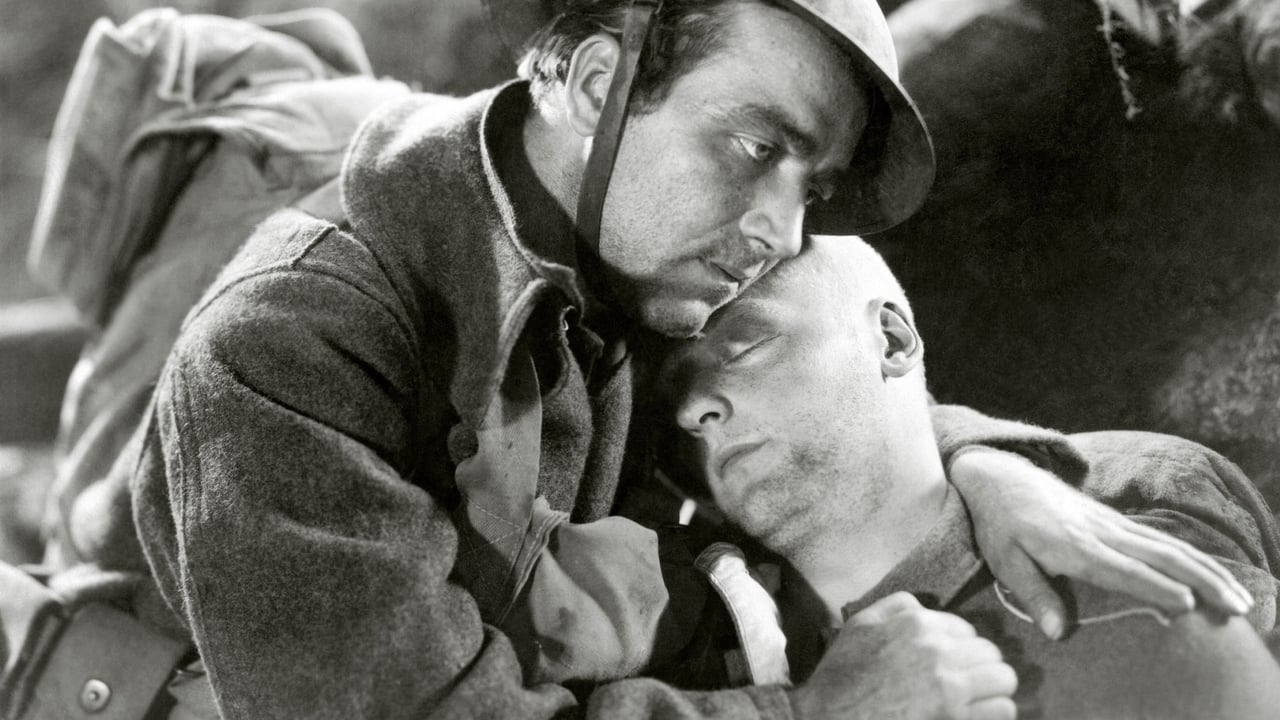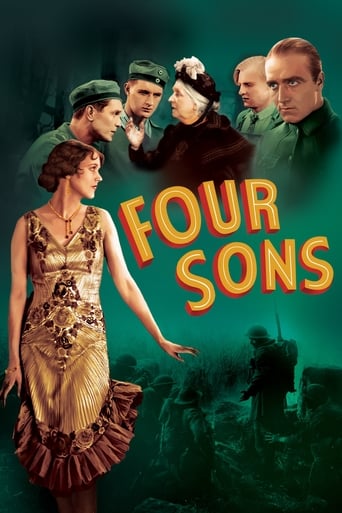


. . . ALL QUIET ON THE WESTERN FRONT, except that Melodramatic Hokum and Sappy Schmaltz have been substituted for FRONT's Gritty Authenticity and Cutting-Edge Realism. The only character who rings True in FOUR SONS is the Fascist German "Major Von Stromm," because "it takes one to know one," and SONS director John Ford often infamously Out-Hitlered Hitler. Just as Adolph had a guy behind-the-scenes engineering his "Final Solution," Hollywood's version of J. Edgar Hoover--John Ford--conspired in the Shadows with Anti-American Traitors whom could have been shot for High Treason, such as Marion Mitchell Morrison and Joe McCarthy, to foment a virtual military coup against the U.S. Constitution, Freedom, and Democracy, outlawing Decency and Intelligent Thought. Ford's decades-long Reign of Terror was so total that it thoroughly traumatized Tinseltown into awarding his Second-Rate Output Umpteen Oscars as they declared him The Movie Messiah. SONS version of World War One comes from Fox Studio, so its relationship to Actual War is the same as Fox "News" connection to Actual News: an exercise in Total Distortion.
... View MoreIn Germany, at the dawn of World War I, widow Margaret Mann (as Frau Bernle) is blessed with "Four Sons" - strapping soldier Francis X. Bushman Jr. (as Franz), dreamy rustic James Hall (as Joseph), handsome metalworker Charles Morton (as Johann), and fair-haired shepherd George Meeker (as Andreas). And, she makes the best honey-cakes in Bavaria. With one son serving the Fatherland, and two more about to join him on the battlefield, Ms. Mann arranges for adventurous Mr. Hall to emigrate to democratic America. There, he opens a delicatessen and marries sweet, beautiful June Collyer (as Annabelle). Eventually, the Great War results in multiple brother tragedies, testing old mother Mann's ability to count her blessings.The last years of the "silent film" era produced an avalanche of stunning motion pictures; in hindsight, you wonder if the "talkie" might have prevented the silent from advancing even beyond its late 1920s peak. "Four Sons" is another artful example, with John Ford and his picturesque cameramen, George Schneiderman and Charles C. Clarke, directing under the influence of F.W. Murnau - the combination produced a winning film, full of memorable scenes and images. Ford's best symbolic double whammy has two white birds flying to heaven, followed by postman Albert Gran hurling stoning the church's reflection. The restored print looks lovely, but lacks the original's innovative "synchronized sound effects" track, which will hopefully turn up somewhere.The film won the "Best Picture" of 1928 medal from "Photoplay" and placed #4 on the annual "Film Daily" honor roll.********* Four Sons (2/13/28) John Ford ~ Margaret Mann, James Hall, George Meeker, Charles Morton
... View MoreJohn Ford is truly great filmmaker this is the pinnacle (well in my opinion) of silent film. Margaret Mann is a revelation her performance is so enthralling especially in some of the final scenes at the end of the picture.The story is a strong one but the direction and the way it is put together is truly sensational Ford himself is Irish and this film i feel may be close to his roots.I was amazed the film didn't have many title cards however it was so simple to follow and by the end of it you're moved by mann's performance. you feel and care for the characters the whole way through that's the mark of a great film.And for the film buffs watch the early scenes in the film you got to love the tracking shot the mark of master John Ford
... View MoreA huge, huge hit in 1928 and the winner of the Photoplay Medal of Honor (a fan-chosen award that was very big then), this soap opera actually offers little that you wouldn't have seen in an earlier and more powerful hit, The Four Horseman of the Apocalypse. (Except the village sets-- you saw those in Sunrise.) It's a similar saga about a family whose members wind up on opposite sides of the big war (WWI); only after the war ends does the story take a new direction, when the mother comes to America to visit the son who moved there. These scenes, though somewhat manipulative (the mom gets lost at Ellis Island and winds up on a subway car in the city-- a neat trick if it didn't involve ever being on a boat), are the most moving parts of the movie.
... View More